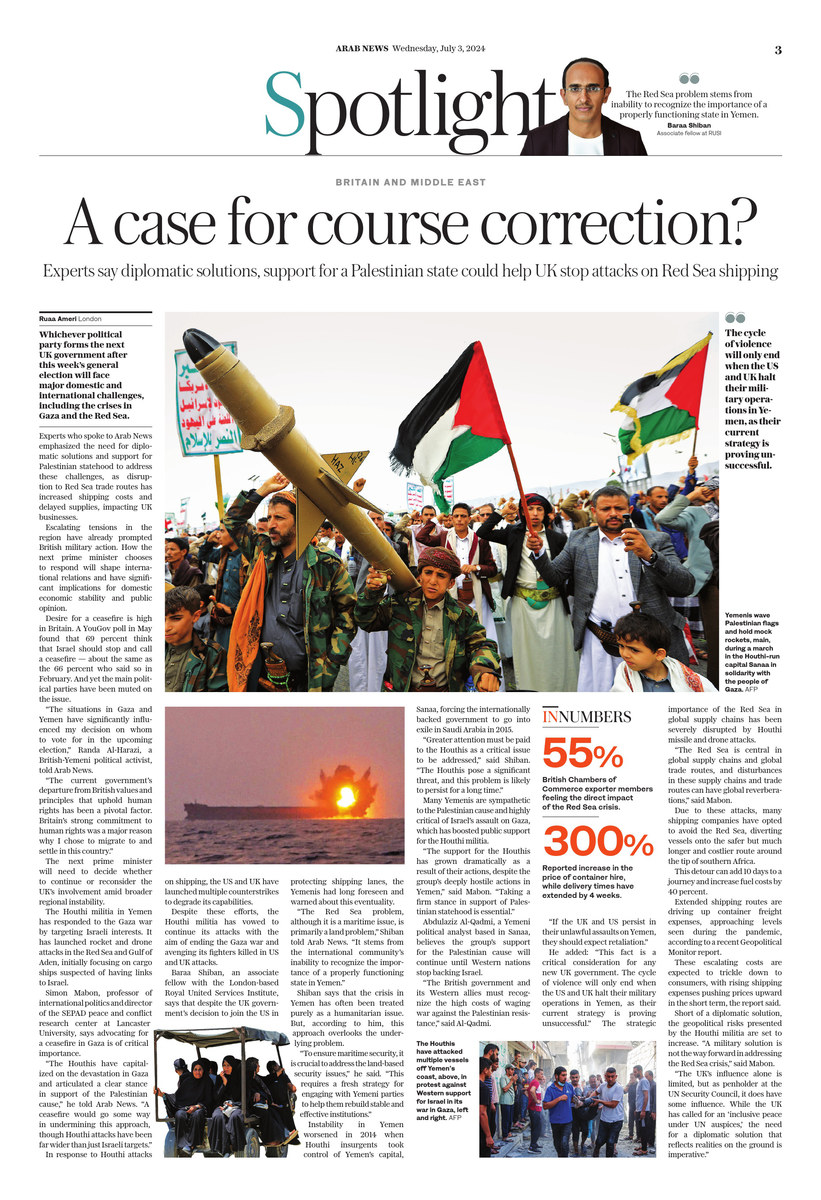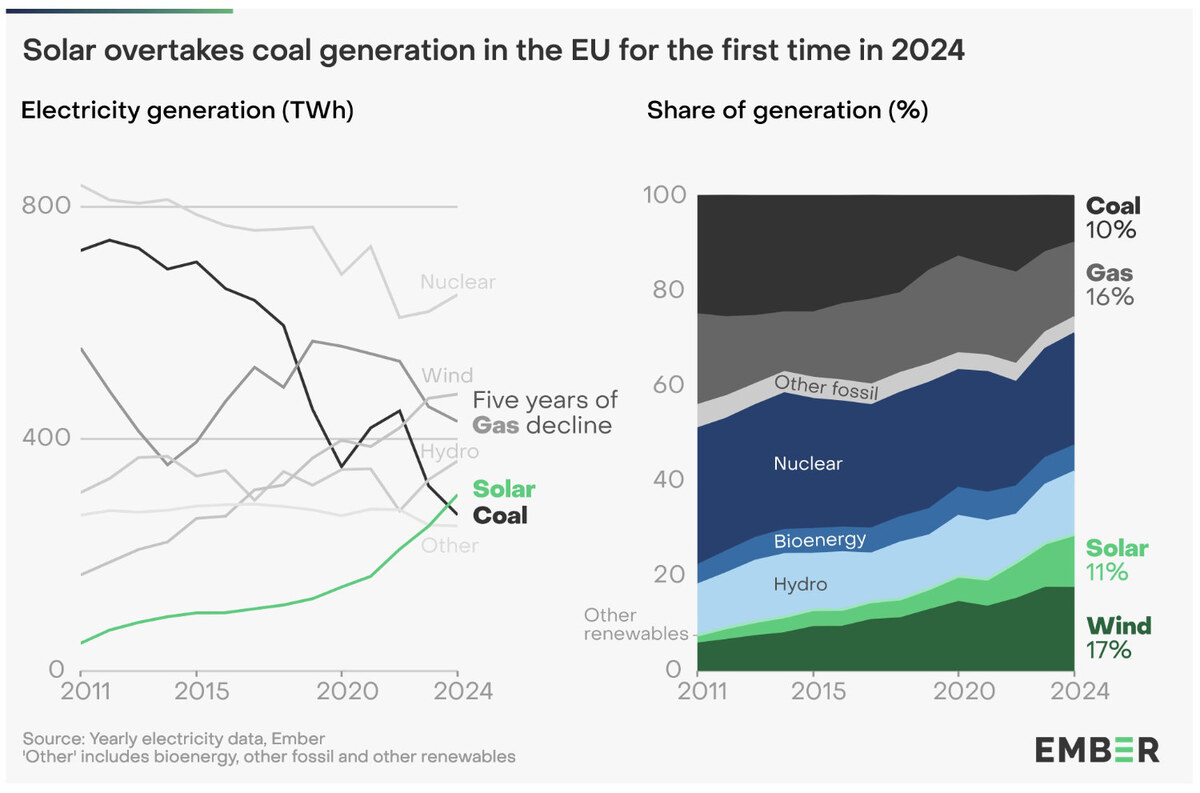LONDON: Whichever political party forms the next UK government after this week’s general election will face major domestic and international challenges, including the crises in Gaza and the Red Sea.
Experts who spoke to Arab News emphasized the need for diplomatic solutions and support for Palestinian statehood to address these challenges, as disruption to Red Sea trade routes has increased shipping costs and delayed supplies, impacting UK businesses.
Escalating tensions in the region have already prompted British military action. How the next prime minister chooses to respond will shape international relations and have significant implications for domestic economic stability and public opinion.
While polling suggests a potential Labour majority, ending more than a decade of Conservative rule under five successive prime ministers, including incumbent Rishi Sunak, the political landscape remains complex.
The Labour Party has gained ground in many areas and reclaimed councils it has not held in decades, but has also faced setbacks in key constituencies with large student and Muslim communities.

Britain’s PM and Conservative Party Leader Rishi Sunak delivers a speech during a visit during a general election campaign event in northern England, on July 1, 2024 in the build-up to the UK general election on July 4. (AFP)
These traditionally loyal demographics have voiced a distinct reason for this shift — namely Labour leader Keir Starmer’s response to the Gaza issue.
Desire for a ceasefire is high in Britain. A recent YouGov poll in May found that 69 percent think that Israel should stop and call a ceasefire — about the same as the 66 percent who said so in February. And yet the main political parties have been muted on the issue.
Britain’s Arab citizens have been urged by the Arab Voice campaign to support candidates who best serve Arab and Muslim communities, focusing on those who stand with Gaza.
“The situations in Gaza and Yemen have significantly influenced my decision on whom to vote for in the upcoming election,” Randa Al-Harazi, a British-Yemeni political activist, told Arab News.
“The current government’s departure from British values and principles that uphold human rights has been a pivotal factor. Britain’s strong commitment to human rights was a major reason why I chose to migrate to and settle in this country.”

A woman stands holding a child surrounded by the rubble of buildings destroyed during Israeli bombardment in Khan Yunis on the southern Gaza Strip on June 23, 2024.
Escalating international pressure for a Gaza ceasefire has led to huge protests across the UK, notably mobilized by the Palestine Solidarity Campaign.
While the general election campaigns of the main parties have primarily focused on domestic issues, the incoming prime minister will have to address the escalating tensions in the Middle East, exacerbated by the Gaza conflict between Israel and Hamas.
Opinion
This section contains relevant reference points, placed in (Opinion field)
Non-state actors within the Iran-led “Axis of Resistance” have launched attacks against British ally Israel, ostensibly in solidarity with Hamas and the broader Palestinian cause, posing a threat to global trade security.
The next prime minister will need to decide whether to continue or reconsider the UK’s involvement amid broader regional instability.

The Houthis have attacked multiple vessels off Yemen’s coast in protest against Western support for Israel in its war in Gaza. (AFP)
As part of the Axis of Resistance, the Houthi militia in Yemen — also known as the Ansar Allah — has responded to the Gaza war by targeting Israeli interests. It has launched rocket and drone attacks in the Red Sea and Gulf of Aden, initially focusing on cargo ships suspected of having links to Israel.
Simon Mabon, professor of international politics and director of the SEPAD peace and conflict research center at Lancaster University, says advocating for a ceasefire in Gaza and enduring peace in the Occupied Palestinian Territories is of critical importance.
“The Houthis have capitalized on the devastation in Gaza and articulated a clear stance in support of the Palestinian cause,” he told Arab News. “A ceasefire would go some way in undermining this approach, though Houthi attacks have been far wider than just Israeli targets.”
In response to Houthi attacks on shipping, the US and UK have launched multiple counterstrikes, targeting the militia’s coastal radar installations, unmanned aerial vehicles, surface vessels, weapons storage facilities, missile launch sites and other military assets to degrade their capability to continue attacks.
Despite these efforts, the Houthi militia has vowed to continue attacks and to retaliate against the US and UK. Its latest statements emphasize ending the Gaza war as a primary objective of its attacks while also speaking of avenging its fighters killed in US and UK attacks.

A grab from handout footage released by the Houthis on November 19, 2023, reportedly shows members of the group during the capture of an Israel-linked cargo vessel at an undefined location in the Red Sea. (AFP)
Baraa Shiban, an associate fellow with the London-based Royal United Services Institute, says that despite the UK government’s decision to join the US in protecting shipping lanes, the Yemenis had long foreseen and warned about this eventuality.
“The Red Sea problem, although it is a maritime issue, is primarily a land problem,” Shiban told Arab News. “It stems from the international community’s inability to recognize the importance of a properly functioning state in Yemen.”
Shiban says that the crisis in Yemen has often been treated purely as a humanitarian issue, with a focus on feeding the population. But, according to him, this approach overlooks the underlying problem — the Houthi insurgency that hinders the state’s functionality.
“To ensure maritime security, it is crucial to address the land-based security issues,” he said. “This requires a fresh strategy for engaging with Yemeni parties to help them rebuild stable and effective institutions.”

Protesters hold placards and wave Palestinian flags as they gather in Parliament Square, central London, on June 8, 2024. (AFP)
Instability in Yemen worsened in 2014 when Houthi insurgents took control of Yemen’s capital, Sanaa, forcing the internationally backed government to go into exile in Saudi Arabia in 2015.
“Greater attention must be paid to the Houthis as a critical issue to be addressed,” said Shiban. “The Houthis pose a significant threat, and this problem is likely to persist for a long time.”
Many Yemenis are sympathetic to the Palestinian cause and highly critical of Israel’s assault on Gaza, which has boosted public support for the Houthi militia. Large demonstrations in cities, both within and outside Houthi-controlled areas, such as Taiz, reflect this widespread sentiment.
“The support for the Houthis has grown dramatically as a result of their actions, despite the group’s deeply hostile actions in Yemen,” said Mabon. “Taking a firm stance in support of Palestinian statehood is essential.”

Many Yemenis are sympathetic to the Palestinian cause and highly critical of Israel’s assault on Gaza, which has boosted public support for the Houthi militia. (AFP)
The Houthi militia has been able to use this to bolster military recruitment in the regions it controls, aiding its struggle against Yemen’s internationally recognized government and associated armed factions.
Abdulaziz Al-Qadmi, a Yemeni political analyst based in Houthi-controlled Sanaa, believes that the group’s support for the Palestinian cause will continue until Western nations, including the UK, cease their backing of the Israeli government.
“The British government and its Western allies must recognize the high costs of waging war against the Palestinian resistance,” said Al-Qadmi.
“If the UK and US persist in their unlawful assaults on Yemen, they should expect retaliation. Previously, Ansar Allah targeted only ships bound for Israel, but now UK and US vessels will also be vulnerable to attacks.”
He added: “This fact is a critical consideration for any new UK government. The cycle of violence will only end when the US and UK halt their military operations in Yemen, as their current strategy is proving unsuccessful.”
INNUMBERS
- 10 Number of additional days it takes for ships to traverse southern Africa to avoid the Red Sea route.
- 55 percent British Chambers of Commerce exporter members feeling the direct impact of the Red Sea crisis.
- 300 percent Reported increase in the price of container hire, while delivery times have extended by 4 weeks.
- 70 percent Proportion of Europe’s car parts shipped through the Red Sea from Asia, which now face disruption.
The strategic importance of the Red Sea in global supply chains has been severely disrupted by Houthi missile and drone attacks, with 107 recorded incidents since the hijacking of the Galaxy Leader on Nov. 19.
“The Red Sea is central in global supply chains and global trade routes, and disturbances in these supply chains and trade routes can have global reverberations,” Lancaster University’s Mabon said.
Due to these attacks, many shipping companies have opted to avoid the Red Sea, diverting vessels onto the safer but much longer and more costly route around the tip of southern Africa, passing the Cape of Good Hope.
This detour can add 10 days to a journey and increase fuel costs by 40 percent. A British Chambers of Commerce survey in February found that 55 percent of its exporter members have felt the direct impact of the Red Sea crisis. Some reported price rises of 300 percent for container hire and delivery times extended by four weeks.
Manufactured goods from Asia, especially cars, have been the hardest hit. About 70 percent of Europe’s car parts are shipped through the Red Sea from Asia. Due to the disruption, carmakers such as Volvo and Tesla have had to suspend some production lines because of a lack of parts.
Some companies are realigning their supply chains to cope with these challenges. Retailers such as Asos and Boohoo have increased nearshoring, sourcing more products from countries such as Turkiye and Morocco, as well as within the UK.

This handout grab of a video by the French ‘Etat-Major des Armees’ shows a Houthi UAV threatening commercial navigation prior to its destruction by a French army helicopter in the Red Sea on March 20, 2024. (AFP)
This shift helps them to avoid the longer lead times and inflated prices associated with rerouting shipments from Asia.
Extended shipping routes are driving up container freight expenses, approaching levels seen during the pandemic, according to a recent Geopolitical Monitor report.
These escalating costs are expected to trickle down to consumers, given that rising shipping expenses will persistently push prices upward in the short term, the report said.
Short of a diplomatic solution, the geopolitical risks presented by the Houthi militia are set to increase. “A military solution is not the way forward in addressing the Red Sea crisis,” said Mabon.
“The UK’s influence alone is limited, but as penholder at the UN Security Council, it does have some influence. While the UK has called for an ‘inclusive peace under UN auspices,’ the need for a diplomatic solution that reflects realities on the ground is imperative.”
































